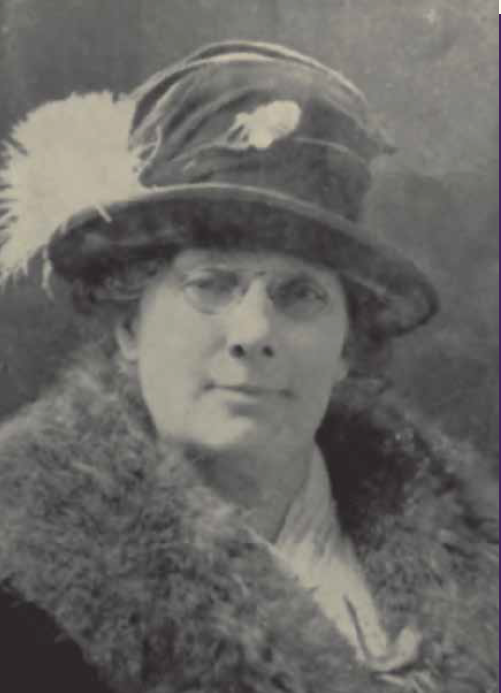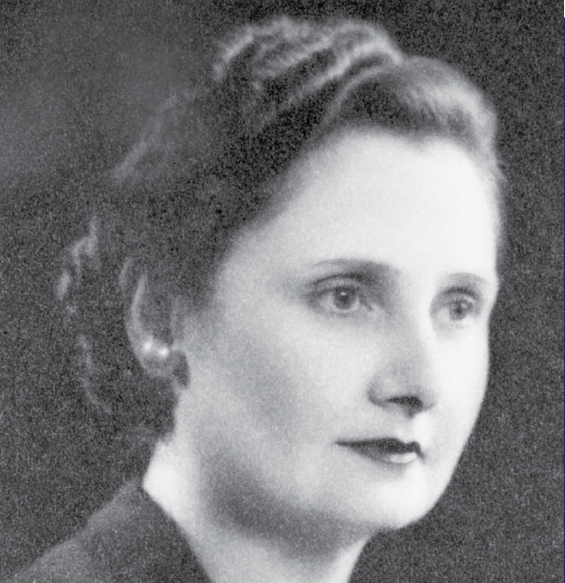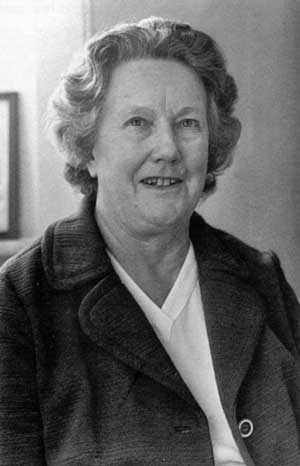Jersey’s first female election candidate
 Caroline Trachy
Caroline Trachy
Women in Jersey were able to vote in elections from 1919 but it took the repeated efforts of one woman to become a politician before the law was changed to enable women to stand for election.
In December 1922, Caroline Trachy stood for election as a Deputy in the parish of St. Helier. She was successfully proposed and seconded, but she was disallowed after the nomination process on the grounds that, although women could nominate and vote in States elections, they were not eligible to stand.
Caroline founded the Jersey Women Political Union on 9 April 1923, which aimed to obtain “full political and civil rights for women in Jersey, embracing legal and moral support to women in difficulties caused by present, unjust laws”.
On 17 August 1923 the Union submitted a General Petition to the States requesting full civil rights for women. The journal ‘The Vote’ described that petition as asking, “for the granting to women of full civil and political rights now enjoyed by the women of Great Britain”. However, when the petition reached the States, it was only moderately successful. A Law passed in February 1924 that made women eligible to stand as Deputies, but only if they were separated. A second law, the Married Women’s Property Act, was passed in February 1925, which removed the rate-paying clause from a woman’s eligibility but did not permit married women to stand for election.
In the wake of those changes, Caroline stood again in the 1925 election but was disqualified by the Royal Court and the Bailiff on the grounds that she was not separated. Her response was that she would not “prejudice other married women by being separated” and would continue her fight.
The States went on to change the law and in April 1928, Caroline became an eligible candidate for the upcoming election, but was not elected by the people of Jersey and ranked last in the polls. It would be another 20 years before the first female States Member would be sworn into office.
Jersey’s first female politician

Ivy Forster
It was 30 years after women in Jersey secured the right to vote that the first female was elected as a member of the States of Jersey.
Ivy Forster was elected as a Deputy for St. Helier in 1948. Jersey had been occupied by the Nazis during World War II and during that time Ivy had helped escaped Russian slave workers who had been brought to the Island by the Nazis. For almost two years, Ivy had sheltered Russian prisoner-of-war, Geigori Koslov, in her attic. She was arrested in May 1944, but managed to avoid deportation due to illness, and was permitted to serve her sentence on-Island.
After Jersey’s liberation, Ivy became an after-dinner speaker, giving talks on her experiences during the war, and was encouraged by the Bailiff to stand for election. After being elected as Jersey’s first female politician in 1948, Ivy went on to become the first woman to top the poll when she was re-elected in 1951 but her political career came to an end when she lost her seat in 1954.
Ivy died at the age of 90 in June 1997 and was posthumously named in 2010 as one of 29 “British Heroes of the Holocaust” by the then UK Prime Minister, Gordon Brown.
Heroine of the Occupation
Louise Gould
During the Occupation, Ivy Forster’s sister, Louisa Gould, harboured a Russian clave worker— Feodor Polycarpovitch Buirry– who was also known as ‘Bill’.
In late May 1944, she was arrested by the Nazis for harbouring Russian prisoners of war after a local resident had informed on her sister’s activities. ‘Bill’ stayed with Ivy and her family for five days, before escaping to seek refuge with Bob Le Sueur. Louisa had been arrested a week earlier, charged with “abetting breach of the working peace and unauthorised removal” and for possessing a wireless radio.
Ivy received a sentence of five a half months, but fell ill and was transported to the General Hospital. Whilst there, Dr Raymond Osmont managed to convince the German’s that she had Tuberculosis by switching her medical samples and forging false papers with a Dr McKinstry, and should not travel. She served her sentence on-Island.
Louisa was sent to Ravensbruck Concentration Camp, arriving on the 4th September 1944. She was sent to the gas chambers in February 1945.
Louisa and Ivy’s brother Harold was sent to Bergen-Belsen Concentration Camp, and was the only British male to survive, suffering a complete loss of memory of pre-war life during his internment. He would testify at the Nuremberg trials in October 1945, the Neuengame in 1946, and Banterweg (Wilhelmshaven) in 1947.
In March 1966, Louisa Gould, Ivy Forster and Harold Le Druillenec were awarded gold watches to commemorate their experiences during the Occupation.
The first female Senator
 Gwyneth Huelin
Gwyneth Huelin
Gwyneth Huelin was born Gwyneth Locker on 11th October 1907 in Lichfield, Staffordshire. In 1934 she married Captain (later Lieutenant-Colonel) William Helier Huelin of the 2nd Battalion of the 7th Rajputs in the Indian Army and, for the first few years of their marriage, the couple lived in India. During World War II her husband served in the Middle East and Burma and Gwyneth was a driver for the Red Cross Ambulance and ARP in the Isle of Wight, as well as Secretary to the Red Cross Hospital Supply Service in that island. For her services she was awarded the Civil Defence Medal in 1945.
The couple settled in Jersey after the War and Gwyneth Huelin became well-known for her work with the Women’s Institute and the Associated Country Women of the World. She was Chairman of the Island Federation of Women’s Institutes from 1950-1962 and represented Jersey at several national conferences.
She stood for the States in 1954 in her home parish of St Brelade, which at the time was a single constituency with 2 Deputies, and was elected unopposed, joining Deputy Phyllis Green of St Saviour No. 2 as the only two women in the Assembly.
She was a member of the Public Health Committee from 1954 until her retirement in 1981, being President of the Committee from 1963. Re-elected three times in St. Brelade, in 1966 she stood successfully as Senator, being re-elected twice. She was awarded an MBE in the New Year Honours in 1966 and in 1981 she was awarded an OBE in the Queen’s Birthday Honours, at the time a unique honour for a politician to have received a second award of this kind.
Gwyneth Huelin will principally be remembered for her work as President of the Public Health Committee, a position she held for 18 years and during which time the foundations of a modern health service and hospital were laid. When she became President in 1963 she realised that the hospital facilities needed to be brought up to date and made capable of meeting future demand, being designed for a population of 50,000 at a time when the actual population was reaching 70,000. In addition the facilities at St Saviour’s Hospital were totally inadequate, over-crowded and with no privacy for patients. Under her leadership St Saviour’s was transformed into a modern facility conducive to the recovery of those suffering with mental health conditions. She also oversaw a £15 million project to transform the hospital with the new Gwyneth Huelin Wing being opened in 1980 shortly before she retired from the States.
The first female Constable
Iris Le Feuvre
Iris Le Feuvre was born Iris Renouf in 1928 in St Martin. She attended the States Intermediate School in Brighton Road, St Helier where her contemporaries included Enid Querée (later Enid Quenault), who went on to become Deputy of St Brelade and later Connétable of that parish, and Bill Morvan who Iris succeeded in 1984 as Connétable of St Lawrence.
Coming from a poor background, her early interest in politics had been kindled when she would travel to school on the same bus on States’ days as Connétable John du Val of St Peter, Jurat Francis Le Feuvre and Deputy Philip Le Feuvre of St Mary. The three would sit at the back of the bus to discuss politics and the young Iris would sit as close as possible to overhear their conversation.
During the German Occupation her family sheltered an escaped Russian prisoner of war and, after the Liberation, she worked as a book-keeper. She married Eric Le Feuvre in 1948 and the couple had four sons.
Discouraged to join the Honorary Police, as this was seen at the time as a man’s role, she became involved with the Communicare project and was appointed as Chairman of the Communicare Management Committee in which role she argued strongly for the creation of a day centre for the elderly.
In 1978 she was elected unopposed as Deputy of St Lawrence alongside Hendricus Vandervliet. At the time she stated that she had returned from holiday on Monday, two days before the nomination meeting, not yet having given much thought to the election but by Wednesday evening found herself as one of the two St. Lawrence Deputies. Defeated by John Le Fondré, father of current Senator John Le Fondré, in 1981 she was elected as Connétable in 1984 in a three-cornered fight against Denis Satchwell and Deputy Hendricus Vandervliet. During her time as President of the Education Committee she oversaw the building of the new Haute Vallée School but failed to push through plans to abolish the 14-plus transfer and convert Hautlieu into a sixth-form college.
After her retirement from the States she was awarded an MBE in the 2001 New Year’s Honours for services to the community. In 2003 she headed a group producing a report on Jersey's ageing population and she was also appointed to lead the Co-ordinating Committee for the Eradication of Poverty in Jersey.